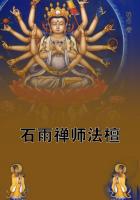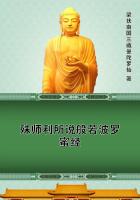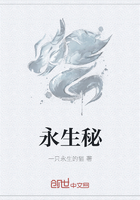They were half-way down the blade of the sword. Whose prints they were I have no earthly clue; but why should anybody hold a sword half-way down?
It was a long sword, but length is an advantage in lunging at an enemy.
At least, at most enemies. At all enemies except one."
"Except one," she repeated.
"There is only one enemy," said Father Brown, "whom it is easier to kill with a dagger than a sword."
"I know," said the woman. "Oneself."
There was a long silence, and then the priest said quietly but abruptly: "Am I right, then? Did Sir Claude kill himself?"
"Yes" she said, with a face like marble. "I saw him do it."
"He died," said Father Brown, "for love of you?"
An extraordinary expression flashed across her face, very different from pity, modesty, remorse, or anything her companion had expected: her voice became suddenly strong and full.
"I don't believe," she said, "he ever cared about me a rap.
He hated my husband."
"Why?" asked the other, and turned his round face from the sky to the lady.
"He hated my husband because...it is so strange I hardly know how to say it...because..."
"Yes?" said Brown patiently.
"Because my husband wouldn't hate him."
Father Brown only nodded, and seemed still to be listening; he differed from most detectives in fact and fiction in a small point-- he never pretended not to understand when he understood perfectly well.
Mrs Boulnois drew near once more with the same contained glow of certainty. "My husband," she said, "is a great man.
Sir Claude Champion was not a great man: he was a celebrated and successful man. My husband has never been celebrated or successful; and it is the solemn truth that he has never dreamed of being so.
He no more expects to be famous for thinking than for smoking cigars.
On all that side he has a sort of splendid stupidity. He has never grown up. He still liked Champion exactly as he liked him at school; he admired him as he would admire a conjuring trick done at the dinner-table. But he couldn't be got to conceive the notion of envying Champion. And Champion wanted to be envied. He went mad and killed himself for that."
"Yes," said Father Brown; "I think I begin to understand."
"Oh, don't you see?" she cried; "the whole picture is made for that-- the place is planned for it. Champion put John in a little house at his very door, like a dependant--to make him feel a failure.
He never felt it. He thinks no more about such things than-- than an absent-minded lion. Champion would burst in on John's shabbiest hours or homeliest meals with some dazzling present or announcement or expedition that made it like the visit of Haroun Alraschid, and John would accept or refuse amiably with one eye off, so to speak, like one lazy schoolboy agreeing or disagreeing with another.
After five years of it John had not turned a hair; and Sir Claude Champion was a monomaniac."
"And Haman began to tell them," said Father Brown, "of all the things wherein the king had honoured him; and he said:
`All these things profit me nothing while I see Mordecai the Jew sitting in the gate.'"
"The crisis came," Mrs Boulnois continued, "when I persuaded John to let me take down some of his speculations and send them to a magazine.
They began to attract attention, especially in America, and one paper wanted to interview him. When Champion (who was interviewed nearly every day) heard of this late little crumb of success falling to his unconscious rival, the last link snapped that held back his devilish hatred. Then he began to lay that insane siege to my own love and honour which has been the talk of the shire. You will ask me why I allowed such atrocious attentions. I answer that I could not have declined them except by explaining to my husband, and there are some things the soul cannot do, as the body cannot fly.
Nobody could have explained to my husband. Nobody could do it now.
If you said to him in so many words, `Champion is stealing your wife,' he would think the joke a little vulgar: that it could be anything but a joke--that notion could find no crack in his great skull to get in by. Well, John was to come and see us act this evening, but just as we were starting he said he wouldn't; he had got an interesting book and a cigar. I told this to Sir Claude, and it was his death-blow. The monomaniac suddenly saw despair.
He stabbed himself, crying out like a devil that Boulnois was slaying him; he lies there in the garden dead of his own jealousy to produce jealousy, and John is sitting in the dining-room reading a book."
There was another silence, and then the little priest said:















